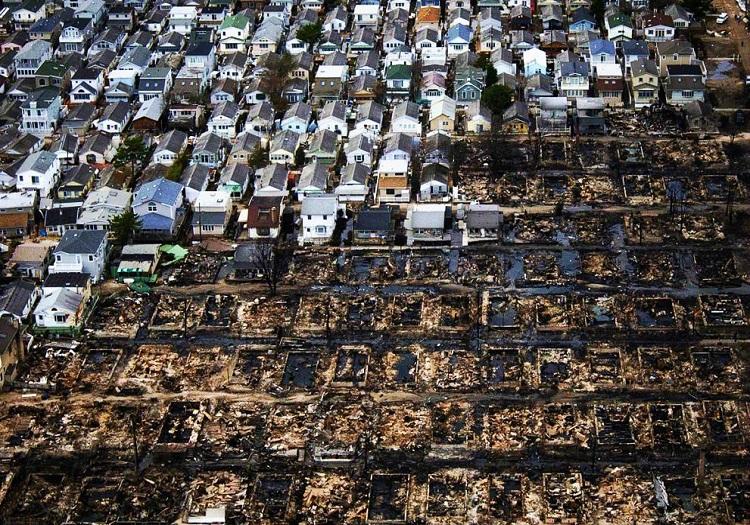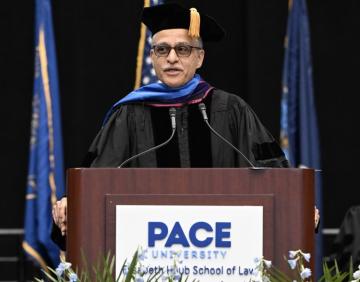Adjunct Professor Keith Sullivan Successfully Represents Clients in Superstorm Sandy Litigation

The NYS Court of Appeals Sides with Haub Law Adjunct Faculty Member in Rejecting A Governmental Immunity Defense for A Public Authority in $100 Million Superstorm Sandy Litigation. Trial Court Rejects Defendants Summary Judgment Motions Clearing the Path For A Jury Trial
In February 2018, the New York State Court of Appeals ruled in a 6-0 judge opinion in Heeran v. Long Island Power Authority & National Grid, that the defendants are not immune from liability under the legal doctrine of "Governmental Immunity". The defendants have been sued by over 150 home and business owners who lost their properties to fires during Hurricane Sandy, which struck NYC on October 29, 2012. In holding against the defendants, the high court upheld the Second Department, Appellate Division who in a 3-1 decision upheld Queens County, Supreme Court Justice Bernice Siegal’s holding in a July of 2014 decision that the defendants were not free from liability under the governmental immunity defense doctrine of law.
Attorney and 15-year Haub Law adjunct faculty member, Keith Sullivan of Sullivan & Galleshaw, LLP, stated, “If the defendants acted responsibly in preparing for the storm this tragedy would have been avoided. They chose to keep the dangerous electricity flowing into the beachfront communities during the worst storm this area has ever seen without any oversight or monitoring of the lethal electricity and then had the audacity to try and hide behind the idea that governmental immunity insulated them from any liability.”
In ruling against the defendants, the court held “We reject defendants’ claim that the magnitude of the disaster, without reference to the circumstances and nature of the specific act or omission alleged – i.e., the failure to de-energize – renders LIPA’s conduct governmental as a matter of law. Inasmuch as defendants have failed to meet their burden to establish that plaintiffs’ amended complaints failed to state viable claims, we hold that the courts below properly denied LIPA’s motions to dismiss.”
Sullivan added, “Unquestionably, the court reached the right decision. Sadly, while some of our clients are still not back in their homes and businesses are not yet opened, but the defendants chose to spend five years pushing this invalid defense.”
Fourteen months later, on April 1, 2019 Pace Faculty Member, Keith Sullivan secured another victory in the litigation when Queens County Supreme Court Justice Bernice Siegal denied the defendant’s summary judgment motion as well as a motion for trial severances in Heeran v. Long Island Power Authority & National Grid. She held that the defendants must face a jury trial on the issue of liability and damages. Sullivan & Galleshaw, LLP alleged that it was reckless and negligence for the defendants to abandon their fully charged electrical equipment as the narrow Rockaway Peninsula was underwater and battered for hours by the fierce storm. This resulted in three separate massive electrical fires. The fierce fires burned unattended through the night for several hours until the tide receded enough that emergency services could enter the peninsula to combat the flames. By daybreak, over 150 homes and businesses were burned completely to the ground resulting in property damages exceeding $100 million.
Additionally, the court ruled in a separate decision that the case would proceed as one trial. The defendants requested three separate trials -one for each fire in the community.
After 6 years of extensive litigation, the rulings now clear the way for a jury trial to commence later this year.
In rejecting the defendant’s attempt to dismiss the lawsuit, the court stated that "The defendants who provided electricity to areas known to be vulnerable to storm surges could have, and should have, promulgated written protocols for storm de-energization." The judge also ruled that, "the plaintiff's eviscerated " the defense reliance on a "relic" law left over from 1886 and had no application in the current lawsuit.
Plaintiffs’ attorney Keith Sullivan of Sullivan & Galleshaw, LLP, stated, “The defendants showed a total disregard for my clients' health and safety. Industry protocol and common sense called for shutting down the electric system. Sadly, LIPA and National Grid chose to keep the dangerous electric flowing into the very small narrow communities that are completely surrounded by water without any monitoring of the lethal electricity as the surging tides and violent wind barreled into the community.”
In ruling against the defendants request to sever the trial into three separate trials according to each fire location, the court held “…there are common questions of law and facts as evidenced by Defendants’ own motions… further, the interests of judicial economy and consistency of verdicts will be served by having a single trial.”
Sullivan added, “Unquestionably, the court reached the right decisions on both fronts. The motion for three separate trials was nothing more than a failed effort by the defendants to challenge our resolve and try to harm our clients financially by running up the costs and time by three-fold. We will not waiver at all. Sadly, while our clients still struggle, the corporate defendants with unlimited financial resources, chose to spend six years pushing meritless defenses."



